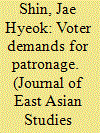|
|
|
Sort Order |
|
|
|
Items / Page
|
|
|
|
|
|
|
| Srl | Item |
| 1 |
ID:
136681


|
|
|
|
|
| Summary/Abstract |
In the early years after independence, predictions were made that the Indian political system would eventually collapse because of the country's diverse population and low per capita income. India however has proven its critics wrong and shown the world that democracy has not only thrived and been sustained but has also deepened. Thus, from a procedural point of view, India has achieved the goal of establishing democracy and in 2014 completed its fourteenth Lok Sabha elections without hindrance. However, as far as substantive democracy and the trajectory of human development are concerned, some of the hopes and aspirations have been only partly realised and others dashed while some developmental indices show that India has underperformed in terms of governance, political participation and political culture.
|
|
|
|
|
|
|
|
|
|
|
|
|
|
|
|
| 2 |
ID:
134855


|
|
|
|
|
| Summary/Abstract |
We study the effects of political participation on holdings of liquid assets in Chinese privately controlled listed firms. Previous research has shown that the risk of political extraction by politicians and bureaucrats in countries with weak institutions has an adverse effect on holdings of liquid assets. We propose that political participation by private entrepreneurs can function as a means to alleviate some of that risk. We find that political participation in China is positively related to cash holdings in regions with weaker institutions. Our results also show that investments in “hard” assets such as PPE and inventories, which are less susceptible to the grabbing hand, are higher in regions with weaker institutions, but that political participation mitigates this effect. Finally, cash holdings have an insignificantly positive effect on firm value on its own, while political participation is positively associated with firm value. The interaction between cash holdings and political participation is positively related to firm value, again suggesting that political participation facilitates the holding of liquid assets in China, which in turn results in better firm performance.
|
|
|
|
|
|
|
|
|
|
|
|
|
|
|
|
| 3 |
ID:
136543


|
|
|
|
|
| Summary/Abstract |
This paper studies women’s participation in village elections. It focuses on the impact of voting rights training on women’s knowledge, and their voting behaviors in Ningxia, China, a Hui nationality autonomous region with a conservative cultural environment for women. A randomized controlled trial has been used in the study
|
|
|
|
|
|
|
|
|
|
|
|
|
|
|
|
| 4 |
ID:
137209


|
|
|
|
|
| Summary/Abstract |
In this article I seek to explain the microfoundations of patronage politics in the developing world. Two distinct approaches have evolved in the literature. One puts emphasis on the demand side, arguing that patronage persists because poor voters tend to desire individualistic goods over policy. The other focuses on the supply side: few politicians offer programmatic policy, so voters have no alternative but to vote for the politicians who distribute patronage. In this study I test those competing theories using original data from Jakarta, Indonesia. I find evidence supporting the demand-side theory: when both patronage and policy are offered, poor, less-educated voters tend to demand patronage, such as jobs and money, over national programs like free education and universal health care, whereas well-off, better-educated voters tend to prefer the national policies. However, the study also reveals that demands for patronage are affected by level of participation in politics: those who voted in previous elections and those who affiliate with a political party are more likely to demand patronage. This microfoundational evidence helps to explain the persistence of patronage politics in places of widespread poverty.
|
|
|
|
|
|
|
|
|
|
|
|
|
|
|
|
|
|
|
|
|